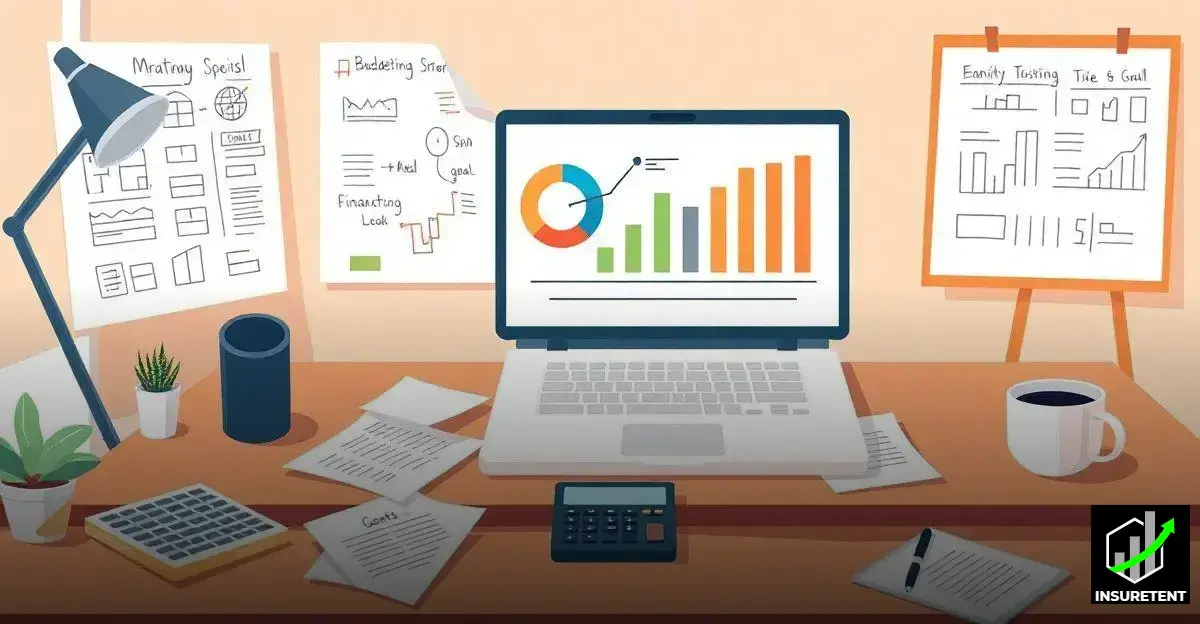Family debt management is essential for maintaining a stable financial future.
With the rising costs of living and unexpected expenses, many families find themselves struggling with debt.
Understanding Family Debt Management
Understanding family debt management is essential for families seeking to regain control over their finances. This process involves assessing the total debt owed, identifying debt sources, and prioritizing repayment strategies. Effective debt management helps families avoid financial stress and provides a clear path toward stability.
One of the first steps in managing family debt is to create a detailed budget. This budget should outline all income sources and every expense, allowing families to see exactly where their money is going. Categorizing expenses into necessities and luxuries enables families to identify areas where they can cut back.
Next, families should explore different debt repayment methods, such as the debt snowball method—focusing on paying off smaller debts first—or the debt avalanche method, which prioritizes debts with the highest interest rates. Both methods have advantages and can motivate families as they start to see progress.
Communication within the family is another vital component of effective debt management. By discussing financial challenges openly, family members can support each other in budgeting and sticking to repayment plans. This teamwork fosters a positive financial environment and reduces the stigma associated with debt.
Incorporating financial tools can also simplify debt management. Various apps are available to help track spending, set budget limits, and remind families of upcoming payments. By using these tools, families can streamline their financial management processes and stay organized.
Finally, families should not hesitate to seek professional assistance if debt becomes overwhelming. Financial advisors can provide valuable insights and strategies tailored to a family’s unique situation, offering guidance on consolidating debts or negotiating with creditors.
The Importance of Budgeting

Budgeting is a critical element of family debt management. A solid budget helps families keep track of their money, understand their spending habits, and identify areas to cut costs.
To create an effective budget, families should start by listing all their income sources, including salaries and any additional earnings.
Next, families need to outline their monthly expenses. These are typically divided into two categories: fixed expenses, like rent and utilities, and variable expenses, such as groceries and entertainment. By knowing where money goes each month, families can make informed choices about their spending.
One of the main benefits of budgeting is that it empowers families to set financial goals. Goals might include saving for a family vacation, building an emergency fund, or paying down debt. Setting these goals creates a sense of purpose and motivation to stick to the budget.
Additionally, families should review their budget regularly. This practice helps to adapt to any changes in income or unexpected expenses, ensuring that budgeting remains a relevant tool for managing finances effectively.
Using budgeting apps can also simplify this process. Many apps allow families to track their spending in real time, making it easier to stay within budget. Utilizing technology for budgeting can enhance accountability and provide reminders to adhere to spending limits.
Strategies for Reducing Family Debt
Reducing family debt is a necessary goal for financial health. There are several effective strategies that families can adopt to manage their debts better. One of the most impactful methods is to create a debt repayment plan. This plan should prioritize debts based on interest rates or balances, ensuring that the most urgent debts are addressed first.
Another strategy is to cut unnecessary expenses. Families should review their monthly expenses and identify areas where they can save. This could mean dining out less often, canceling unused subscriptions, or finding more affordable alternatives for necessities.
Additionally, families might consider consolidating their debts. This involves taking out a new loan to pay off current debts, which can simplify payments and sometimes lower interest rates. Debt consolidation merges multiple debts into a single payment, making it easier to manage finances.
Furthermore, increasing income can also help in reducing debt. This could be achieved through side jobs, freelance work, or selling unused items. Every extra bit of income can contribute towards paying off debts more quickly.
Lastly, families should seek professional advice if they feel overwhelmed. Financial advisors can offer tailored advice and strategies that can help families regain control of their finances.
Communication: The Key to Managing Debt Together

Effective communication is essential for managing family debt. Open discussions about finances help families understand their debt situation better and work together toward solutions. By sharing information on income, expenses, and debts, family members can get a clearer picture of their financial health.
Regular family meetings focused on finances can be highly beneficial. These meetings create a space for everyone to express their thoughts and concerns about the family budget and debt, fostering teamwork and encouraging brainstorming on strategies to reduce expenses and increase income.
Openly discussing financial goals also fosters a sense of accountability. When everyone is aware of the goals and commitments, it becomes easier to stick to a budget and monitor progress. This shared understanding allows family members to support one another in making necessary sacrifices.
Creating a non-judgmental environment during these discussions is crucial. Avoiding blame encourages positive dialogue and emphasizes that everyone is working together, which can help alleviate the stress associated with debt.
Finally, sharing even small successes can motivate the family. Celebrating milestones in debt reduction reinforces commitment to the financial plan and boosts overall morale.
Utilizing Financial Tools and Resources
Utilizing financial tools and resources is vital for effective family debt management. There are many tools available that can help families track their expenses and stay within budget. Budgeting apps are one of the most popular options. These apps allow users to input their income and expenses, providing real-time insights into their financial situation.
Another useful resource is online financial calculators. These can help families understand how to allocate funds towards debt repayment and savings. For instance, a debt repayment calculator shows how long it will take to pay off debts at different payment levels.
In addition to these tools, families can benefit from financial literacy resources. Websites, podcasts, and books on personal finance can provide valuable education about managing money, investing, and saving. Learning about concepts such as interest rates, credit scores, and emergency funds is essential for making informed financial decisions.
Moreover, families should consider consulting with financial advisors. These professionals can offer tailored advice and strategies based on the family’s unique situation. They can help families create a comprehensive financial plan that includes budgeting, saving, and debt management.
Lastly, joining a community or support group focused on financial issues can be beneficial. This provides families with a platform to share experiences, advice, and challenges with others facing similar situations.
When to Seek Professional Help

Knowing when to seek professional help in managing family debt is essential for financial wellbeing. Many families attempt to handle debt independently, but there are times when outside assistance becomes necessary. When debt feels overwhelming, it might be time to consult a professional.
A key sign that families could need help is if they struggle to meet monthly payment obligations. Missing payments can lead to late fees and higher interest rates, which only worsen the situation.
If families are only making minimum payments on credit cards, they may be stuck in a cycle of debt that feels unmanageable. A professional can help create a realistic plan to tackle this issue effectively.
Another indication that it’s time to seek help is confusion about which debts to prioritize. A financial advisor can guide families on which debts to pay off first, based on interest rates or urgency.
Some families may feel embarrassed or ashamed about their financial situation. However, consulting a professional can provide a supportive environment to discuss these feelings and develop a plan moving forward.
Finally, if debt rapidly accumulates due to unforeseen circumstances, like medical emergencies or job loss, it’s wise to reach out for help.
Creating a Sustainable Debt Repayment Plan
Creating a sustainable debt repayment plan is essential for families to regain control over their finances. The first step is to assess all debts, including amounts owed and interest rates. Understanding the total debt helps in formulating a clear repayment strategy.
Next, families should calculate their monthly budget to determine how much they can allocate towards debt repayment. This budget must include necessary expenses such as housing, food, and utilities, leaving enough room to address debt obligations.
Once families have a clear budget, they can consider different repayment strategies. Options include the debt snowball method, which focuses on paying off the smallest debts first, or the debt avalanche method, which targets debts with the highest interest rates. Both methods have their benefits, and families should choose one that fits their motivation style.
It is also important to set realistic goals. Families should aim to make consistent payments each month. Even small payments can lead to significant progress over time.
Furthermore, families should regularly review their repayment plan and adjust as needed. Changes in income or expenses can affect the ability to stick to the plan, so flexibility is key.
Lastly, celebrating milestones when debts are paid off can provide motivation. Acknowledging progress fosters a positive outlook on the journey towards becoming debt-free.
Frequently Asked Questions about Family Debt Management
What is family debt management?
Family debt management involves strategies to handle and reduce household debt effectively.
Why is budgeting important in managing debt?
Budgeting helps track income and expenses, allowing families to allocate funds towards debt repayment.
What are some strategies for reducing family debt?
Strategies include creating a debt repayment plan, cutting unnecessary expenses, and consolidating debts.
How can communication help in managing debt?
Open discussions about finances encourage teamwork and support among family members in debt management.
When should we seek professional help for debt management?
It’s advisable to seek help when debts are overwhelming or when you cannot meet monthly payment obligations.
What tools can assist with family debt management?
Budgeting apps, financial calculators, and financial literacy resources can aid in managing family debt.
How can we create a sustainable debt repayment plan?
A sustainable plan involves assessing all debts, setting realistic goals, and regularly reviewing the repayment strategy.
